Education and training for entrepreneurship can directly contribute to a benefit to patient care and outcomes, say Chris Loughlan and Tammy Holmes
The 2011 landmark report Innovation, Health and Wealth set out a grand comprehensive plan for how the adoption and diffusion of innovation could be accelerated across the NHS. It concluded:
“We need to make innovation everybody’s job, from top to bottom of the NHS. We need to outlaw ‘not invented here’ and make a virtue of copying and continuous development and improvement.”
To achieve this, the report also highlighted the need for greater “improvement” skills.
‘Entrepreneurship encompasses attributes, distinct behaviours and, through time, skills’
It should be emphasised at the outset that entrepreneurship is not equated with the present media coverage of adversary critique, the pursuit of global domination and a bottom line of financial return. So what is it? Entrepreneurship is a way of thinking, doing and learning. It encompasses attributes, distinct behaviours and, through time, skills.
Attributes, behaviours and skills of entrepreneurs
Entrepreneurial attributes “is” | Entrepreneurial behaviours “does” | Entrepreneurial skills “becomes more capable of” |
|---|---|---|
| Self-confident | Seeks opportunity | Adding value |
| Ambitious | Takes initiative | Persuading |
| Hard working | Grasps opportunities | Negotiating |
| Idea focussed | Takes calculated risks | Proposing |
| Strong ego | Networks socially | Social skills; personable |
| Autonomous | Problem solves creatively | Takes decisions under uncertainty |
| Committed | Rapid use of judgment | Knows when to listen |
| Achievement oriented | Manages independence | Problem solving |
| Future looking | Action oriented | Resilience to learn from ‘failure’ |
Way of thinking
The way of thinking is perhaps best summed up in both the reasoning and logic of effectuation. Effectual reasoning is a type of human problem solving; it articulates a dynamic and iterative process of creating new artefacts or services in the world. It is a type of human problem solving that takes the future as fundamentally unpredictable, yet controllable through human intention or action; the environment as constructible through choice.
Effectuation is also a logic of entrepreneurial expertise. What makes successful entrepreneurs is not primarily genetic or personality traits, risk seeking behaviour, money, or unique vision. Research has found that there is a science to entrepreneurship and that entrepreneurs across industries, cultures, and time use a “common logic”, or thinking process, to solve entrepreneurial problems. Traditional management thinking uses “causal logic”: selecting between given means to achieve a predetermined goal; entrepreneurial thinking however, proposes imagining a possible service or product using a given set of means.

Way of doing
We need to accept that we do not have all the skills and expertise to achieve this “imagined end” – we certainly have some but we will pick up the necessary skills as we progress. Equally, we do not have all the contacts and networks but we have a reasonably good idea of who we should be getting in contact with and which networks we should be attending.
How we translate our way of thinking into a way of doing or working is best summed up by John Kay in his book Obliquity. Ill health prevention and the promotion of health and wellbeing are complex sciences and arts. “Oblique” approaches recognise that “complex objectives tend to be imprecisely defined and contain many elements that are not necessarily or obviously compatible with each other and that we learn about the nature of the objectives and the means of achieving them during a process of experiment (piloting) and discovery”. The true nature of a health problem or solution only arises when we start to tackle it.
One model that has instigated a systems and systematic entrepreneurial approach to innovation is at the University Hospitals Coventry and Warwickshire Trust. The trust has invested in staff to lead, support, educate and evaluate innovation throughout the organisation. The emphasis is on adding value and making a difference to the level of care to patients, and that ideas can and will come from all levels and from both professional and non-professional groups.
The innovation team undertook a survey so that the trust could make informed decisions on future activity and have a baseline to measure progress and success. Part of this entrepreneurial approach was to ”democratise” involvement in innovation and to link ideas unequivocally with patient care and outcomes.
Way of learning
We have proposed that entrepreneurship is a skill that is developed through motivation, support and development of attributes and behaviours. Our initial ideas will, for the most part, need constructive appraisal – “honest feedback”: we need to know that our idea will not work and why, but some aspects of our proposal and approach don’t have to be neglected or ignored. Our success in entrepreneurship will come through practice and support. The level and nature of this support will come from expert facilitating rather than simply “telling”. We learn to work effectively in small teams, we accept the role of mentors and we geared to act. The expression to “fail more effectively” is part of a way of entrepreneurial learning: we experiment, manage risks, pilot our ideas to develop what the future product or service looks like.
An article in HSJ in January, “Why 80s kids will transform the NHS”, described both the source and methods of innovation over the next decade. It highlighted the need to place opportunity to innovate close to the source of delivery, to ensure that leaders can connect with creative staff and for organisational culture to adopt a more open non-hierarchical approach to delivery of innovation.
Successful innovation, however, is situational; it happens in context; some authors make the case that innovation is relatively easy. It is the adoption and implementation that takes greater and sustained effort, which requires science, art and political savvy.
‘Providing a range of formal and informal educational opportunities will realise benefits to staff, which in turn will result in better patient care and outcomes’
Moreover, NHS organisations can now engage with academic health science networks to help facilitate the development and adoption of innovation at scale and at pace. These organisations, though structurally new to the landscape, are from a strategic sense well placed geographically and their staff are certainly not new to the business of adoption and implementation. Will AHSNs, however, take an entrepreneurial approach to their way of working and seek to develop education in improvement skills in NHS staff?
The networks (with a remit to work at regional level and encourage synergies of practice) could look to promote, support and implement a range of initiatives that lead on entrepreneurship and improvement skills.
These could include the matched funding of interested parties (through a competitive process) on entrepreneurship courses. There are excellent Institute of Leadership and Management courses at the Cambridge Institute and the National Centre for Entrepreneurship in Education.
The AHSNs could assist NHS organisations with placing an entrepreneur in residence (with declared interests) on senior management teams, creating an easy to use “checklist” for educational audit review, arranging visits to organisations that have taken a lead on innovation, coordinating breakfast seminars with informal talks on entrepreneurship skills. There is no one size fits all in this context – providing a range of formal and informal educational opportunities will realise benefits to staff, which in turn will result in better patient care and outcomes.
Dr Chris Loughlan is chief executive at the Cambridge Institute for Research, Education and Management and Tammy Holmes is research, development and innovation operations manager at University Hospitals Coventry and Warwickshire Foundation Trust




















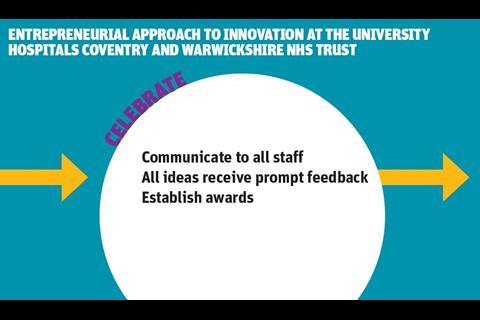
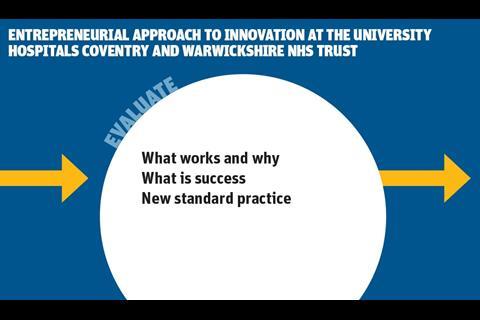
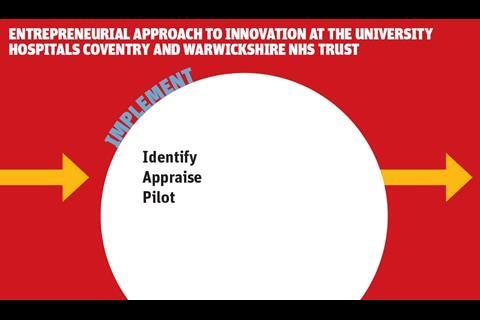
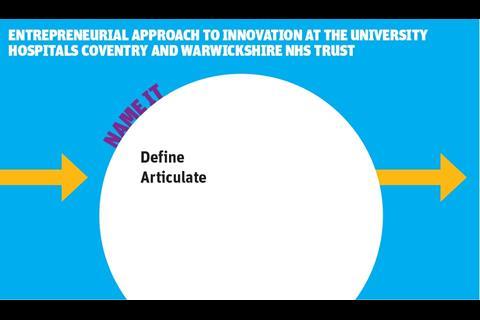
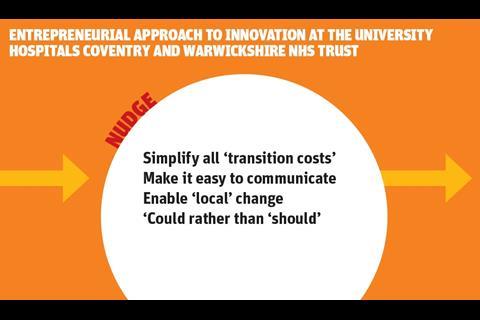
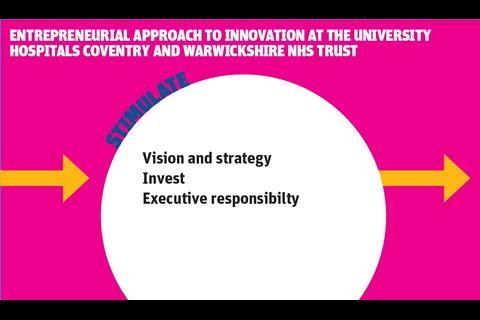






No comments yet